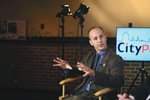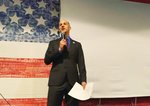


As the dust settles on a tumultuous election season in Lansing, Lansing Mayor Andy Schor is already charting out ambitious plans for his second term — including ideas on how to relocate City Hall, build a performing arts center downtown and spend $50 million in federal funding.
Schor sat down with managing editor Kyle Kaminski to look back at his landslide victory and outline his top priorities. Those include plans to curb rising levels of gun violence and to help steer the city through the end of the pandemic.
...
You were elected by a landslide, garnering about 64% of the vote. Any particular issues that you think helped secure that landside margin? Police funding?
Our residents want the police to act right. They expect de-escalation. They expect us to make sure that they’ve got training. But they want the police. Our citizens want to feel safe in their homes. They may be concerned about the police pulling people over for certain things or patrolling in certain areas, but they expect police to be there. We need to have resources for those who have mental health problems, as well as resources for substance abuse and homelessness. They also expect officers to act right. If there’s an issue of racism, then they expect us to take care of it. They also expect those in need to be helped and not put in jail. When the efforts to defund the police first came up, the first thing I said was: “We’re going to talk to the community.” We’ve had that conversation, and people want to police officers on the street.
In an interview last month, you said that “nothing changes” — either after Election Day or after your second term begins in January. Is that the takeaway? Four more years of the same?
It’s not like I’m going to make some sudden changes. I’m going to do what I said I was going to do and, for the most part, it’s going to be continuing to build on those last four years. I think we’ll certainly look at a few different things. We might have a little bit of staff turnover with some new ideas — but not a lot. We were pretty bold in the first term, with many successes.
Any administrative restructuring or major cabinet changes?
I’d like to get arts and culture into one of our departments. We don’t really have that designated to a department. I also want to see how we can make the most of federal dollars for public safety, roads and bridges and for controlling climate emissions. In my next budget, I expect more grant writing.
You’re particularly proud of the Capital City Market development. What’s the next big thing?
We’ve got a lot of different things on the table. A lot of people waited for the election to see: “Is he going to be there to pull it through?” Now, we’re going to pursue a few big projects.
We’re going to have a lot of things. Now that the election is done, there’s more stability to make plans. There’s some cool stuff happening over by the Frandor Shopping Center, and I think that Sears building is being repurposed, but that’s not my announcement to make. We have some ideas of some things there. And on the south side, I think you’ll see some other announcements.
On the night of the election, you talked a lot about regionalism. How do you plan to leverage the broader power of the Greater Lansing region in a way that benefits the city?
We’ve done a lot with regionalism, and I plan to do more of that — like 425 agreements with other communities where we can do a tax share. Maybe there will be developments outside of the city where we provide some of the utilities and we receive more money because of that.
I’m very close with Ron Bacon, who just got elected to the East Lansing City Council. We’ve talked about how our two cities can form partnerships. We’re also looking at things we can do with Delhi Township. I can’t get into those details, but you’ll know when it happens. We’re also doing a lot with the Lansing Economic Area Partnership and the county to help administer grants for small businesses and offer rental or mortgage assistance. I believe in taking care of Lansing first and foremost. But I also believe that when we work together, it’s good for citizens.
You also spoke about a more equitable future for Lansing in your post-election speech. What does that mean for you and what sorts of deliberate steps can you take to help there?
It means everybody has the equal opportunity to get ahead, and those who haven’t have extra ability. Southwest Lansing has not seen the investments that other areas of the city have, so we’re going to do more work there, as well as in Northwest Lansing. We’ll also work a lot with our groups that represent people of color. We’ve got grant funding for equity work. It’s about looking at everything through an equity lens and making sure that everybody can succeed — especially those who haven’t in the past. That will be really important.
What’s at the top of your priority list?
Stopping crime and fixing roads. But that doesn’t mean that I’m not working to strengthen neighborhoods, our parks, river trails, corridor improvements, and economic development. We certainly want to do more to address the issues of necessity, which is crime — everything from speeding to homicide. Then, it’s physical infrastructure. It’s paving potholes and fixing the roads.
It’s another record-setting year for homicides. What’s the plan to save the next life?
It’s really about stopping those who would get involved in gun violence from even going down the wrong path to begin with. We need to have all of our community centers open. We’re giving money to nonprofit groups working at the front end to prevent violence before it begins.
It’s also about getting illegal guns off the street. I don’t have a problem with legal guns, but getting illegal guns off the street is the single best way to prevent gun violence. We also have to offer alternatives for youth. I’d also love more patrols and more community policing.
The Police Department had 20 vacancies last August. How is the hiring process going?
We brought on five or six officers since then, and I think we have another six or seven that are coming through the academy. We’re working on staffing. I hope the end of the election also means it’s the end of this police divestment conversation. That can scare potential officers.
We’re getting close to full capacity, but then we’re also going to have more retirements. I want to keep the staff flowing in, and we’re getting close, but those retirements will put us behind again. Part of this is about streamlining the hiring and part of this is balancing experienced officers with rookies. You don’t want one third of your force being rookies, because then you lack experience.
The city is still committed to providing at least $240,000 to the Advance Peace program for next year. Anything else on your gun violence prevention agenda in Lansing?
Our gun violence task force is working on setting up a meeting with judges and the prosecutor. There are a lot of questions about personal recognizance bonds and how quickly people can end up back on the street after they’re arrested. We want to bring in outside parties. Congresswoman Elissa Slotkin’s office has also been involved alongside some state legislators because there are some people who truly believe we need changes to our gun laws.
We’ve given money to outside organizations to try and reduce gun violence. We have put money into more police positions that we’re trying to fill. Now we have to figure out: How do we make sure that somebody who has guns, who has been violent, isn’t immediately put back on the street? That’s why there are some discussions about bonds and judges getting involved.
You criticized Ingham County Prosecutor Carol Siemon for enacting a policy that prevents companion felony firearm charges except for in “extreme” circumstances. Do you still think that policy is standing in the way of justice being served in Lansing? Is it a big roadblock for cops?
I still have concerns about the policy because of the victims. I don’t know. I know our officers are very concerned about people knowing that they’re not going to face consequences specifically for that gun-related charge. There are concerns about lessening the consequences.
How quickly do you expect to have a new police chief hired?
By the end of the year. I want the best possible person to help navigate many issues — including gun violence, ensuring officers have proper training and understanding that we expect our officers to act in a certain way. I want someone who will focus on community policing. I want someone to understand that officers are expected to act the right way, and when they’re not, that they will face the appropriate discipline.
How does the city budget look right now? I know there’s plenty of federal cash to go around.
We’re stable. We were able to get our reserves back up. We were able to backfill the budget with the first $25 million. Our income tax revenue was way down. Parking revenues were non-existent. Some of that also went to economic development. There’s about another $25 million left that’s still coming, and we won’t get that other half until next August or September.
What’s the plan for that $25 million?
We’re also going to use some of that money to backfill expected losses. We’ll know what our income taxes look like by the end of the year, and we expect to have an estimate before that.
There are also a lot of folks who have asked for money. A lot of people think we can use it for whatever we want, but we can’t do that. Next month, we’re going to have a public I’m inviting all the groups that have asked for money to come and explain why it should go to them.
The other caveat is that we have until 2024 to spend this money. I want to keep an eye on the following year too before we put that money on the streets.
You hired a sustainability manager within the last year. How’s that work going?
We will continue to work on things with sustainable energy that reduce carbon emissions. We’ve got our climate action plan. So, we’re working toward those goals. Our vehicle fleet is important. And we’ve got a few Chevy Bolts now, so we’re trying to convert our fleet to renewable energy. Getting out of this aging City Hall building and then getting into a more energy efficient building will be hugely important. We’re working to assess our energy efficiencies, so we’ll be doing a lot of work there and saving a lot of money in the process.
Do you have a plan to find a new building?
I’ve had a lot of people randomly bring me different ideas. We’re going to go back out and ask again and see what’s really out there. I’ve got at least three people who think they can make a plan work — including with the 54-A District Court and the Police Department lockup.
I’m willing to look at maybe a daytime lockup. And because of the future of remote work, we’re also looking at whether we need the same physical footprint for office space. We’ll always need people in the office for some things, but maybe we don’t need a conference room in every department. Maybe we can have shared workspaces? Do we need 130,000 square feet?
I really want a customer service center — one easy place for people to go for city services. If we can figure out a way to do that, then show me how this can work and we’ll move it forward.
The next state budget includes $2 million in funding for a future performance hall in Lansing — bringing the total to about $10 million to get this project going. Is it going to happen?
It’s going to happen. We just have to determine the location now. We’ve had a lot of people pitch different locations. I want it downtown, so I’ve given people a month or two months.
We’re giving people some time to crunch the numbers and then we’ll move forward with a plan. We’ve got $10 million. It’s going to happen. I’d like to make an announcement before January.
Support City Pulse - Donate Today!
Comments
No comments on this item Please log in to comment by clicking here